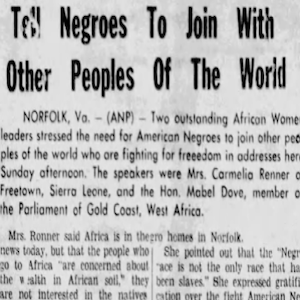Short Teaching Module: Race, Gender, and Transnational Histories of Solidarity
Overview
Studying transnational histories of solidarity among women of African descent reveals new dimensions of global political and social movements through the intersection of race and gender. Where nationalist narratives of progress acknowledge Black women’s various challenges to social, political, and economic oppression, this framing often obscures the connections people made between their experiences at home and those of global communities abroad. Approaches to recovering these historical connections include biography, attending to local activism as well as overlapping movement building. In these spaces, the activities, ideas, and networks they established across borders offers a more expansive understanding of collective challenges to interlocking systems of global oppression.
Primary Sources
Credits
Yatta Kiazolu is a University of California President's Postdoctoral Fellow in the Department of Ethnic Studies at UC San Diego. She received her PhD in History from UCLA with research interests including Contemporary Africa and African Diaspora Studies, African American history, and Women and Gender studies.

